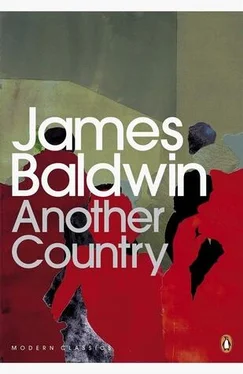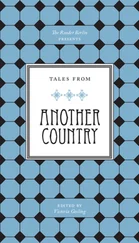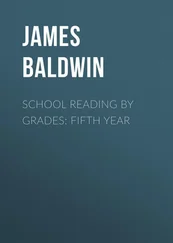Then he stood at the subway steps, looking down. For a wonder, especially at this hour, there was no one on the steps, the steps were empty. He wondered if the man in the booth would change his five-dollar bill. He started down.
Then, as the man gave him change and he moved toward the turnstile, other people came, rushing and loud, pushing past him as though they were swimmers and he nothing but an upright pole in the water. Then something began to awaken in him, something new; it increased his distance; it increased his pain. They were rushing — to the platform, to the tracks. Something he had not thought of for many years, something he had never ceased to think of, came back to him as he walked behind the crowd. The subway platform was a dangerous place — so he had always thought; it sloped downward toward the waiting tracks; and when he had been a little boy and stood on the platform beside his mother he had not dared let go her hand. He stood on the platform now, alone with all these people, who were each of them alone, and waited in acquired calmness, for the train.
But suppose something, somewhere, failed, and the yellow lights went out and no one could see, any longer, the platform’s edge? Suppose these beams fell down? He saw the train in the tunnel, rushing under water, the motor-man gone mad, gone blind, unable to decipher the lights, and the tracks gleaming and snarling senselessly upward forever, the train never stopping and the people screaming at windows and doors and turning on each other with all the accumulated fury of their blasphemed lives, everything gone out of them but murder, breaking limb from limb and splashing in blood, with joy — for the first time, joy, joy, after such a long sentence in chains, leaping out to astound the world, to astound the world again. Or, the train in the tunnel, the water outside, the power failing, the walls coming in, and the water not rising like a flood but breaking like a wave over the heads of these people, filling their crying mouths, filling their eyes, their hair, tearing away their clothes and discovering the secrecy which only the water, by now, could use. It could happen. It could happen; and he would have loved to see it happen, even if he perished, too. The train came in, filling the great scar of the tracks. They all got on, sitting in the lighted car which was far from empty, which would be choked with people before they got very far uptown, and stood or sat in the isolation cell into which they transformed every inch of space they held.
The train stopped at Fourteenth Street. He was sitting at the window and he watched a few people get on. There was a colored girl among them who looked a little like his sister, but she looked at him and looked away and sat down as far from him as she could. The train rolled on through the tunnel. The next stop was Thirty-fourth Street, his stop. People got on; he watched the stop roll by. Forty-second Street. This time a crowd got on, some of them carrying papers, and there were no seats left. A white man leaned on a strap near him. Rufus felt his gorge rise.
At Fifty-ninth Street many came on board and many rushed across the platform to the waiting local. Many white people and many black people, chained together in time and in space, and by history, and all of them in a hurry. In a hurry to get away from each other, he thought, but we ain’t never going to make it. We been fucked for fair.
Then the doors slammed, a loud sound, and it made him jump. The train, as though protesting its heavier burden, as though protesting the proximity of white buttock to black knee, groaned, lurched, the wheels seemed to scrape the track, making a tearing sound. Then it began to move uptown, where the masses would divide and the load become lighter. Lights flared and teetered by, they passed other platforms where people waited for other trains. Then they had the tunnel to themselves. The train rushed into the blackness with a phallic abandon, into the blackness which opened to receive it, opened, opened, the whole world shook with their coupling. Then, when it seemed that the roar and the movement would never cease, they came into the bright lights of 125th Street. The train gasped and moaned to a halt. He had thought that he would get off here, but he watched the people move toward the doors, watched the doors open, watched them leave. It was mainly black people who left. He had thought that he would get off here and go home; but he watched the girl who reminded him of his sister as she moved sullenly past white people and stood for a moment on the platform before walking toward the steps. Suddenly he knew that he was never going home any more.
The train began to move, half-empty now; and with each stop it became lighter; soon the white people who were left looked at him oddly. He felt their stares but he felt far away from them. You took the best. So why not take the rest? He got off at the station named for the bridge built to honor the father of his country.
And walked up the steps, into the streets, which were empty. Tall apartment buildings, lightless, loomed against the dark sky and seemed to be watching him, seemed to be pressing down on him. The bridge was nearly over his head, intolerably high; but he did not yet see the water. He felt it, he smelled it. He thought how he had never before understood how an animal could smell water. But it was over there, past the highway, where he could see the speeding cars.
Then he stood on the bridge, looking over, looking down. Now the lights of the cars on the highway seemed to be writing an endless message, writing with awful speed in a fine, unreadable script. There were muted lights on the Jersey shore and here and there a neon flame advertising something somebody had for sale. He began to walk slowly to the center of the bridge, observing that, from this height, the city which had been so dark as he walked through it seemed to be on fire.
He stood at the center of the bridge and it was freezing cold. He raised his eyes to heaven. He thought, You bastard, you motherfucking bastard. Ain’t I your baby, too? He began to cry. Something in Rufus which could not break shook him like a rag doll and splashed salt water all over his face and filled his throat and his nostrils with anguish. He knew the pain would never stop. He could never go down into the city again. He dropped his head as though someone had struck him and looked down at the water. It was cold and the water would be cold.
He was black and the water was black.
He lifted himself by his hands on the rail, lifted himself as high as he could, and leaned far out. The wind tore at him, at his head and shoulders, while something in him screamed, Why? Why? He thought of Eric. His straining arms threatened to break. I can’t make it this way . He thought of Ida. He whispered, I’m sorry, Leona, and then the wind took him, he felt himself going over, head down, the wind, the stars, the lights, the water, all rolled together, all right . He felt a shoe fly off behind him, there was nothing around him, only the wind, all right, you motherfucking Godalmighty bastard, I’m coming to you .
It was raining. Cass sat on her living-room floor with the Sunday papers and a cup of coffee. She was trying to decide which photograph of Richard would look best on the front page of the book-review section. The telephone rang.
“Hello?”
She heard an intake of breath and a low, vaguely familiar voice:
“Is this Cass Silenski?”
“Yes.”
She looked at the clock, wondering who this could be. It was ten-thirty and she was the only person awake in her house.
“Well”—swiftly—“I don’t know if you remember me, but we met once, downtown, in a night club where Rufus was working. I’m his sister — Ida? Ida Scott—”
Читать дальше












